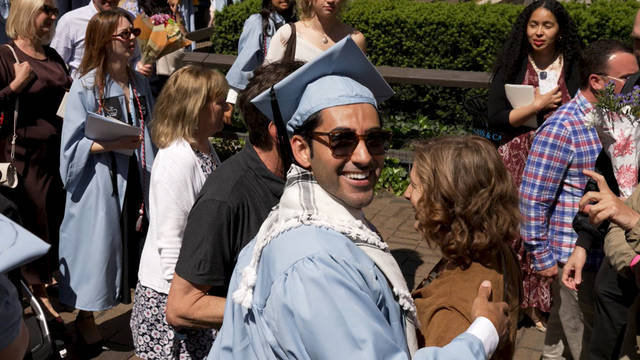
Topics
By Amy Goodman & Denis Moynihan
Columbia University held graduation this week, with thousands receiving their degrees. Some students were missing, though, casting a pall over the proceedings and provoking protests, evidence of ongoing Palestinian solidarity among Columbia’s students, faculty and staff despite the university’s efforts to crush it.
Mohsen Mahdawi was there. As he ascended the stage, he thrust his arms high, his hands giving peace signs to cheers and a standing ovation from his classmates. Mohsen, a Palestinian-born green card holder, was arrested by masked and hooded ICE agents on April 14th when he appeared for his naturalization interview in Vermont. After two weeks in prison, federal Judge Geoffrey Crawford ordered Mohsen’s release, writing: “Our nation has seen times like this before, especially during the Red Scare and Palmer Raids of 1919-1920 [and] during the McCarthy period in the 1950s.”
When the Trump administration attempted to deny Mohsen permission to travel to his graduation, Judge Crawford further ruled, “During his time in New York State, Mr. Mahdawi is permitted to move freely and conduct his daily activities normally including, but not limited to, meeting with elected officials, speaking with and being interviewed by members of the press and media, speaking at public events, attending protests.”
Shortly after receiving his diploma, Mohsen described how he felt, speaking on the Democracy Now! news hour:
“There is a strong sense of joy that I am able to come to this university all the way from a refugee camp, to survive the war.”
He continued, “There is sadness that my family, my parents, could not leave the West Bank and come and see this moment. Sadness that there are no universities left in Gaza where students can experience such joy, where hope can be harnessed.”
Mohsen is only one of many international students targeted by the Trump administration, solely for expressing solidarity with Palestinians and opposing the Israeli assault on Gaza.
Others include Fulbright Scholar Rumeysa Ozturk, a Tufts University grad student from Turkey who was in the US on a student visa. She was snatched off the street by a group of masked, plainclothes federal agents for co-authoring an op-ed in the Tufts newspaper supporting Palestine. Rumeysa spent six weeks in a Louisiana immigration jail until the same Vermont federal court ordered her release.
Another student abducted by ICE is Mahmoud Khalil, a Columbia University grad student with a green card who is married to a US citizen. His wife, Dr. Noor Abdalla, a dentist, was eight months pregnant at the time of his arrest on March 8th. He was briefly held in New Jersey before ICE flew him to Jena, Louisiana, where he remains locked up. He was denied permission to be with his wife when she gave birth to their first child, a son, Deen, on April 21st. On May 22nd, after legal efforts and public outcry, Mahmoud was granted a one-hour contact visit with Noor, and was finally able to hold their newborn son for the first time.
Mahmoud was an organizer of the Columbia Gaza solidarity encampment and chief negotiator with the university. He is a Palestinian, born in Syria, holding Algerian citizenship. As with others targeted for removal, Secretary of State Marco Rubio claims Mahmoud’s continued presence in the US “would have serious adverse foreign policy consequences for the United States.”
Mahmoud’s supporters held an alternative graduation ceremony for him, at a church near campus, where his wife read a statement written by Mahmoud in prison: “‘I was taken from my family and from you, detained simply for speaking the truth about Palestine. Columbia University, the place where we sought knowledge, justice and truth, chose silence instead of solidarity. It failed me, but you didn’t.’”
Mahmoud Khalil wasn’t completely erased at the official proceedings, however. When Columbia University’s acting President Claire Shipman attempted to address the graduates, they replied with sustained booing, followed by, “Free Mahmoud! Free Mahmoud!”
Israel’s assault on Gaza that inspired the Columbia encampments over 19 months ago continues, as do mass protests around the world. Traditional allies of Israel, like the UK, Canada, France and the European Union, are taking steps to limit trade and other relations, demanding Israel allow food and aid into Gaza.
Mohsen Mahdawi remains committed to peace. Though in the final steps on his path to citizenship, he now must fight deportation. Standing in his cap and gown outside Columbia’s School of International and Public Affairs, where he’s been accepted for graduate school, he described his hopes for the future:
“I am coming here to be in the middle of this fire, because I am a peacemaker, because I am a firefighter. I will come here to study international affairs, focusing on diplomacy and security, and focusing on conflict resolution and peacemaking. This is the story of hope, from a refugee camp to Columbia.”

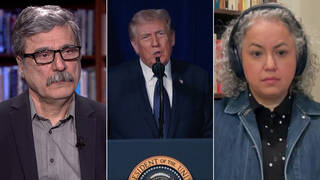
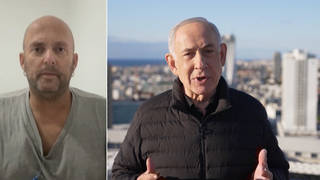
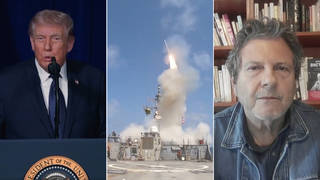
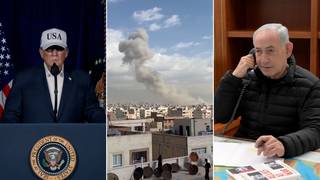




Media Options